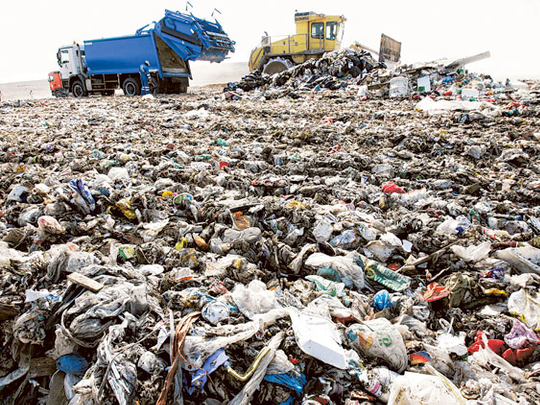
Dubai: Industrial companies in Sharjah will have to clean up their act when a new Dh100 million hazardous waste disposal facility and environment regulations are approved over the next two years, a senior official on the project told Gulf News.
Wekaya, a semi-government medical waste management body, is heading a project to manage and dispose of hazardous industrial waste from Sharjah’s 1900 industrial establishments, said Khalifa Al Shaibani, general manager of Wekaya.
It is also working with the Sharjah executive council to issue a decree for companies to comply with safe ways to dispose of hazardous waste, according to Al Shaibani.
“Not all industrial establishments are complying with good waste disposal practices, so we announced this project to secure better disposal. The industry needs better regulation, a deterrent for violations and a way to make this obligatory,” he said. “Right now there are leakages from industrial waste into public waste and some establishments are not declaring their hazardous waste.”
Wekaya is planning to construct the hazardous waste disposal facility in Al Saja’a area in Sharjah, where waste is currently dumped in a landfill, he added.
The project will allow them to collect accurate data on the amounts of hazardous waste, disposing of it in “scientific” ways, avoid hazardous leakage into groundwater and securing the emirate from pollution, Al Shaibani said.
Cost to companies
Asked about the costs industrial companies will have to bear in compliance with this project, Al Shaibani said: “It is still under study. We will see. It will be in the same range for neighbouring emirates. It will not be costly, they are reasonable fees. The cost is per tonne of waste and there are different types of waste that are treated differently. Each type will have a different cost.”
The regulations to comply with safe disposal are expected within the next two years, he noted. “It will be compulsory by law.”
Companies have to register with Wekaya and the waste will be transported to the new hazardous waste facility. Companies will pay for the service and registration fees, he said.
“There’s always an impact on industry when standards for standards for waste management are taken to more stringnent levels, in part this is the cost od doing business in markets as they mature,” said Ali Hashemi, managing partner of Avicenna Partners, a specialised healthcare investment advisory firm.
Some industrialists in Sharjah acknowledged the costs but supported the idea.
“Anything with hazardous waste disposal has to be paid for so it’s a loss for the businessman but a gain for the public and residents who breathe that air,” said Obaid Al Junaid, owner of Sharjah-based Al Junaid Industries.
However, the regulations should also take into account the interests of the businesses as well and take a holistic view of the economy in addition to the environment, said an industry insider who declined to be named. “Industrialisation here is still at its infancy and they should balance environment with economic activity and study what the effects will be on business: high costs, fines, long procedures. You can fix something but not destroy something else.”












